Charles E W Bean, Diaries, AWM38 3DRL 606/43/1 - April - May 1916 - Part 1
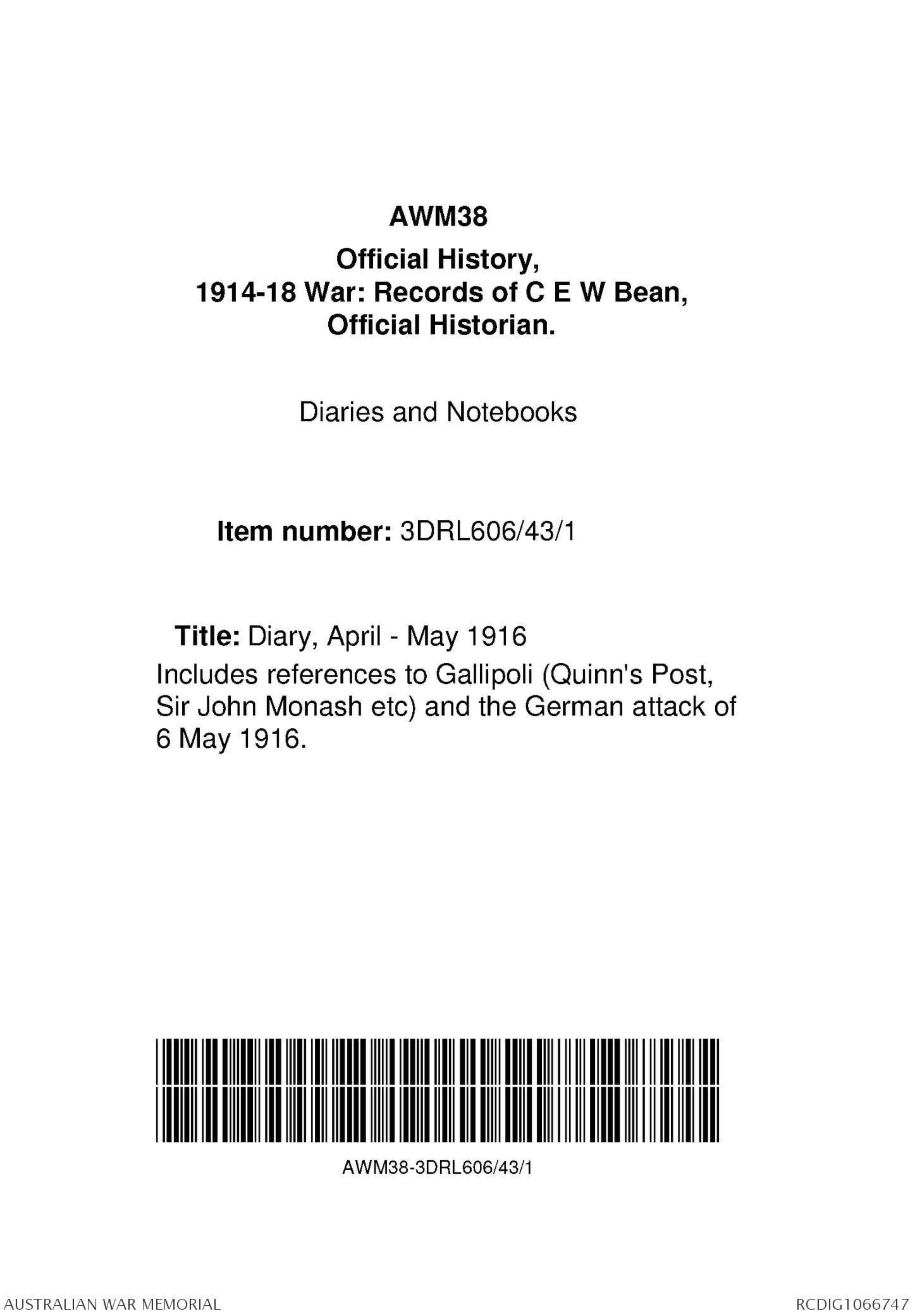
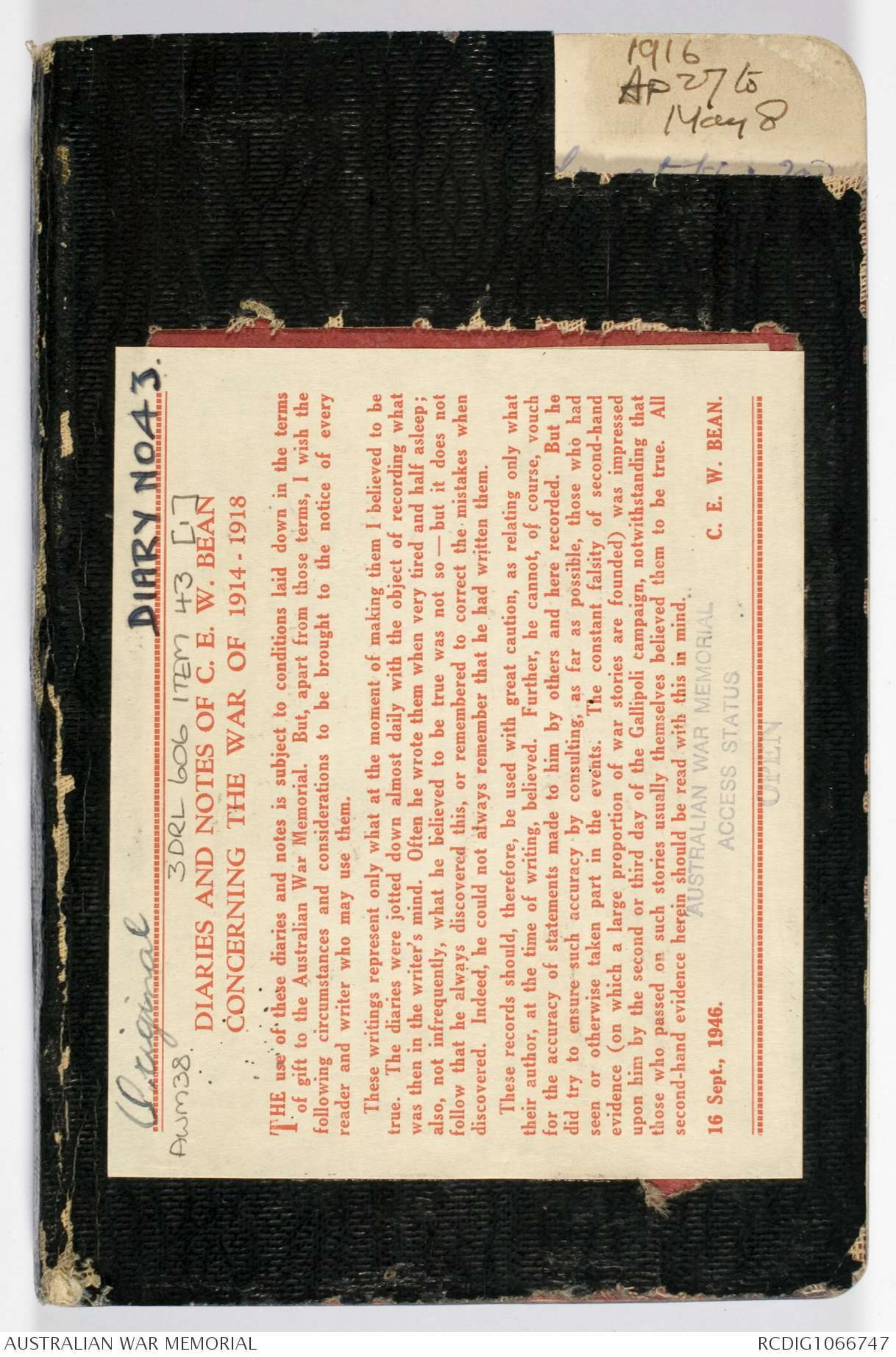
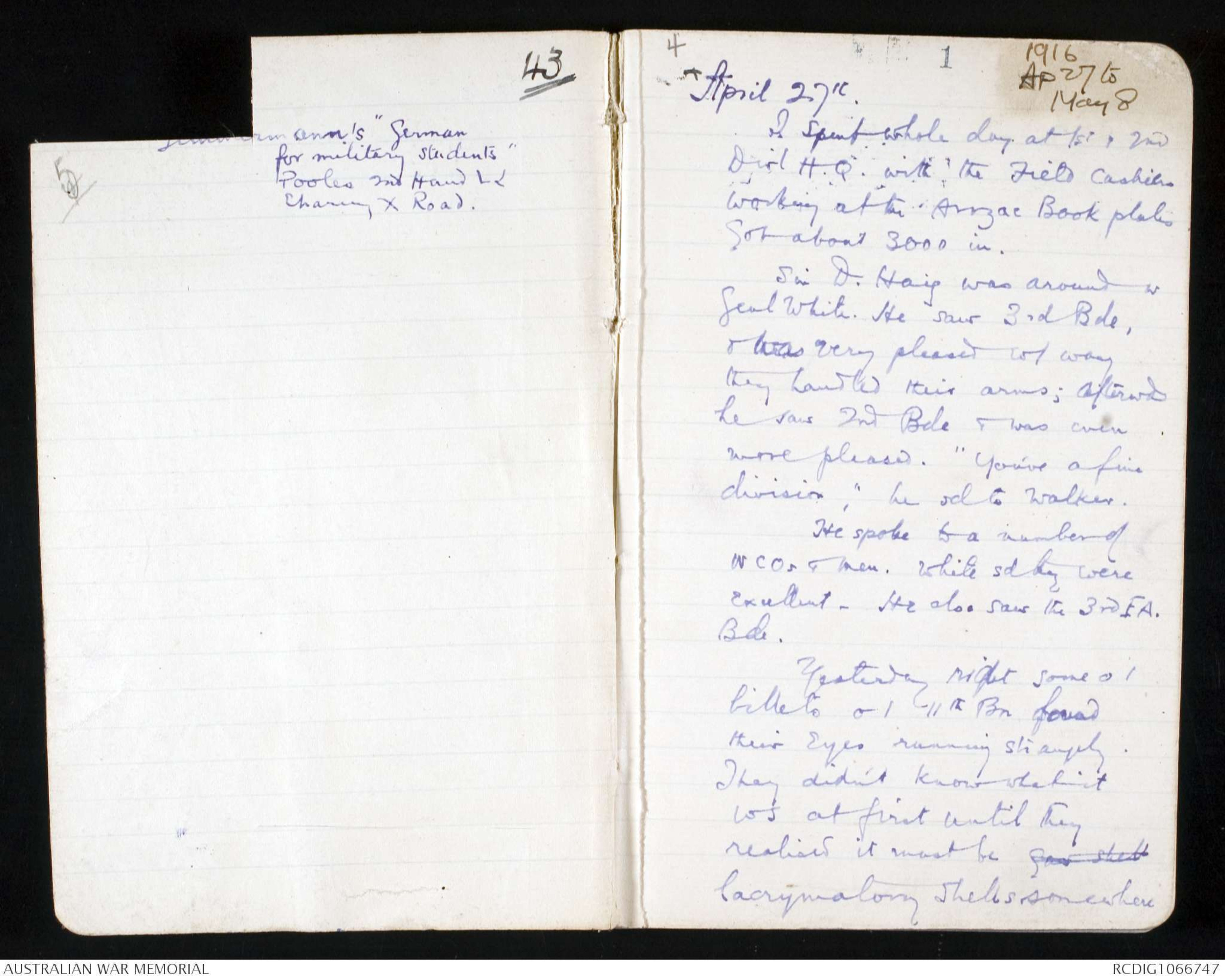
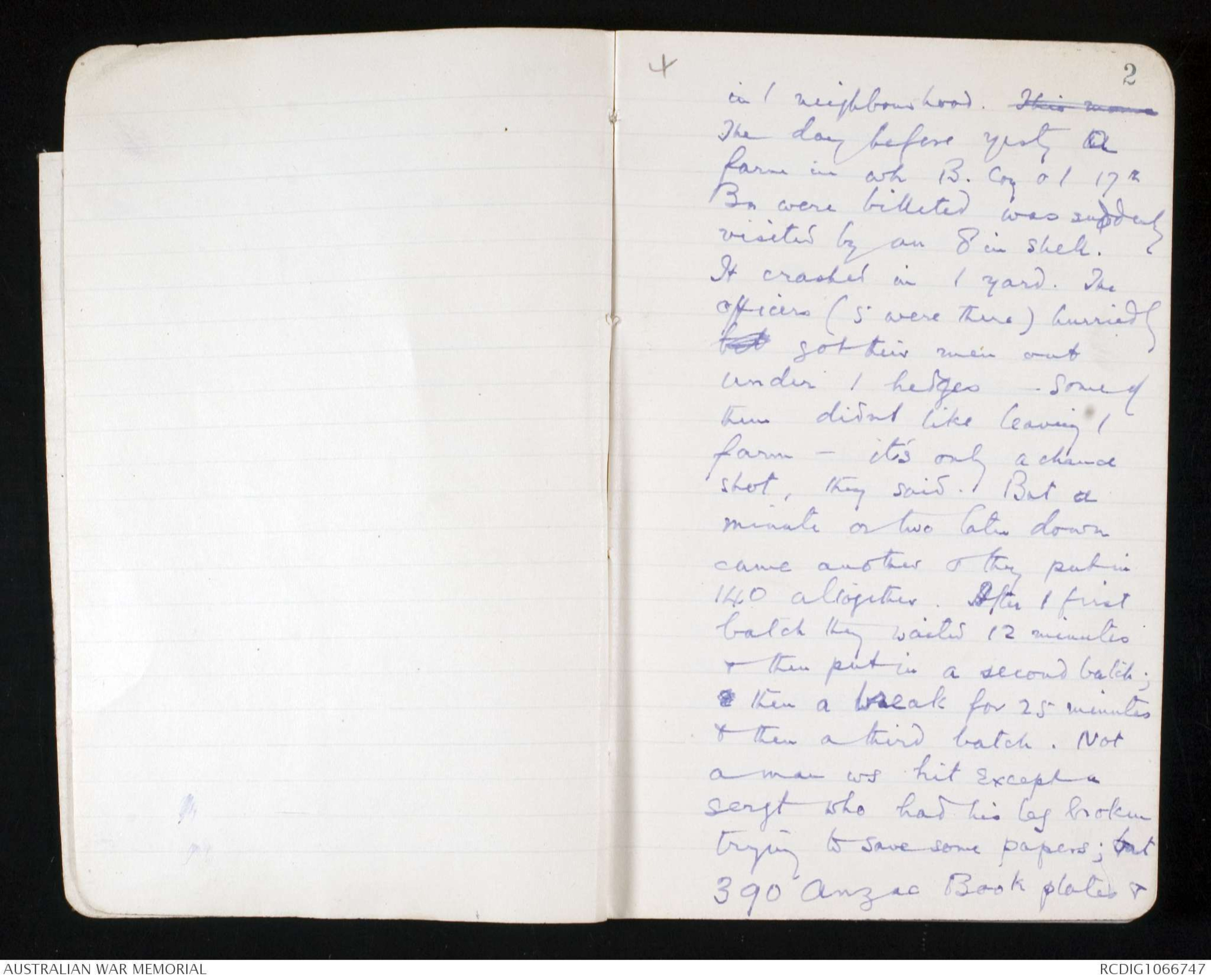
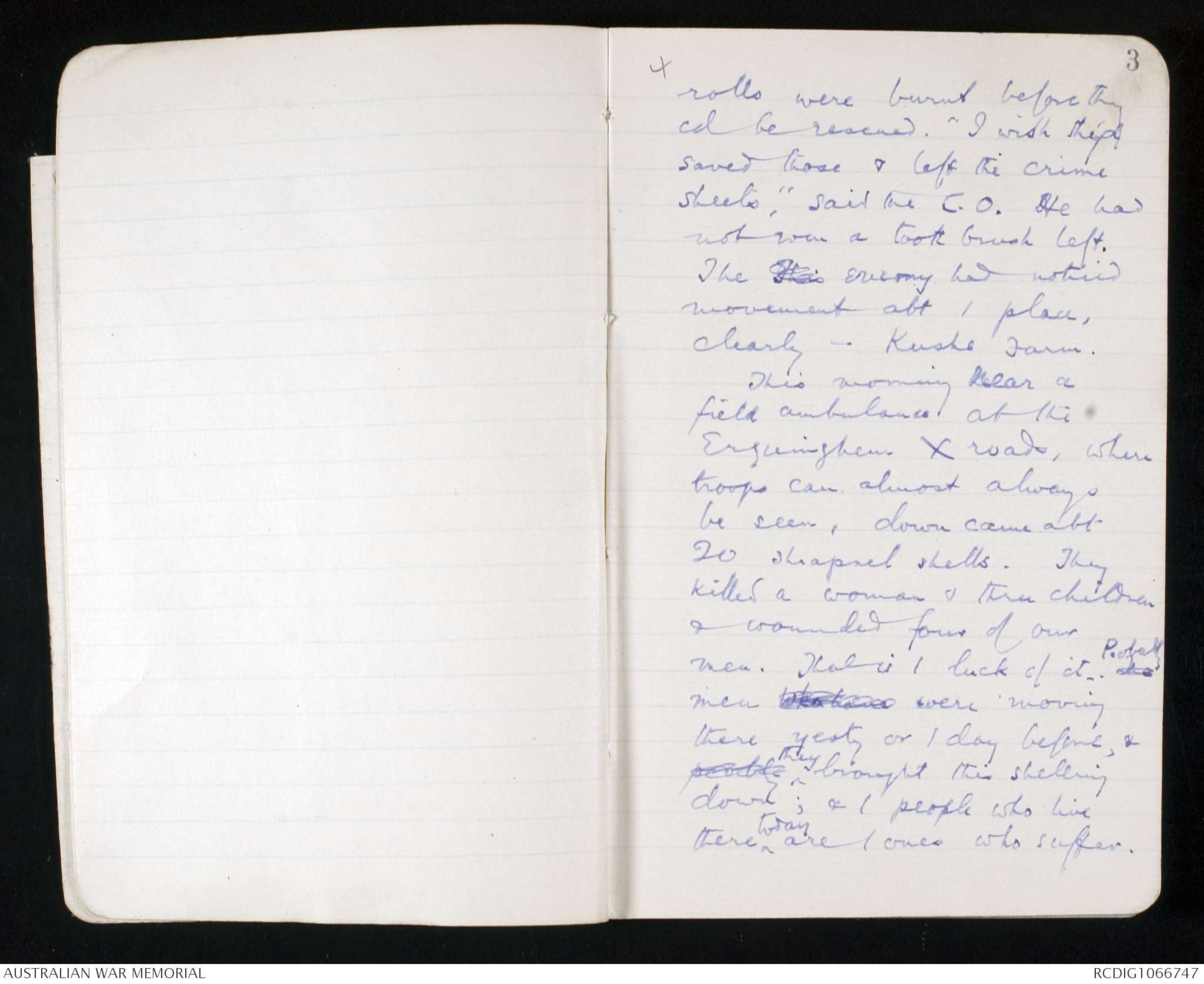
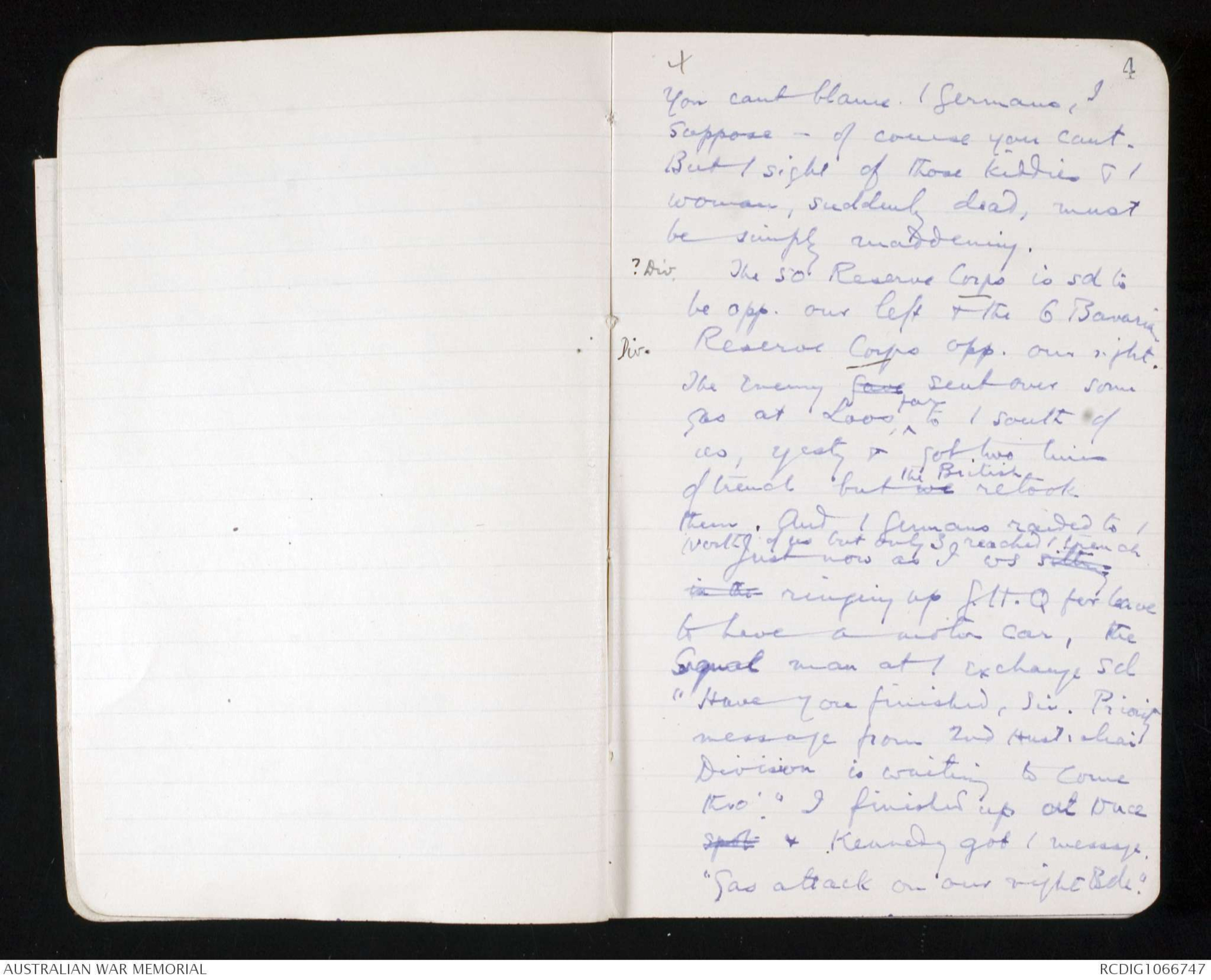
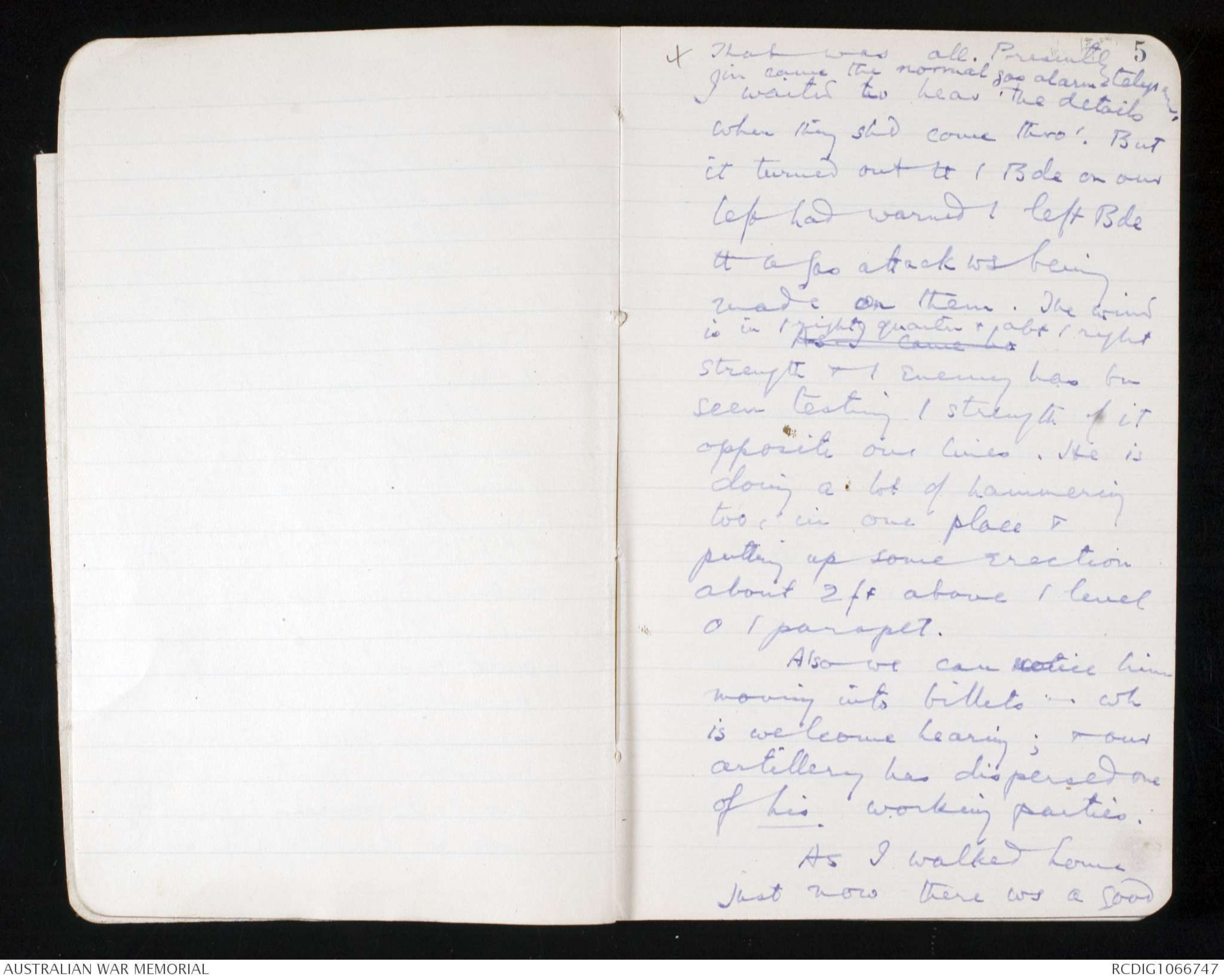
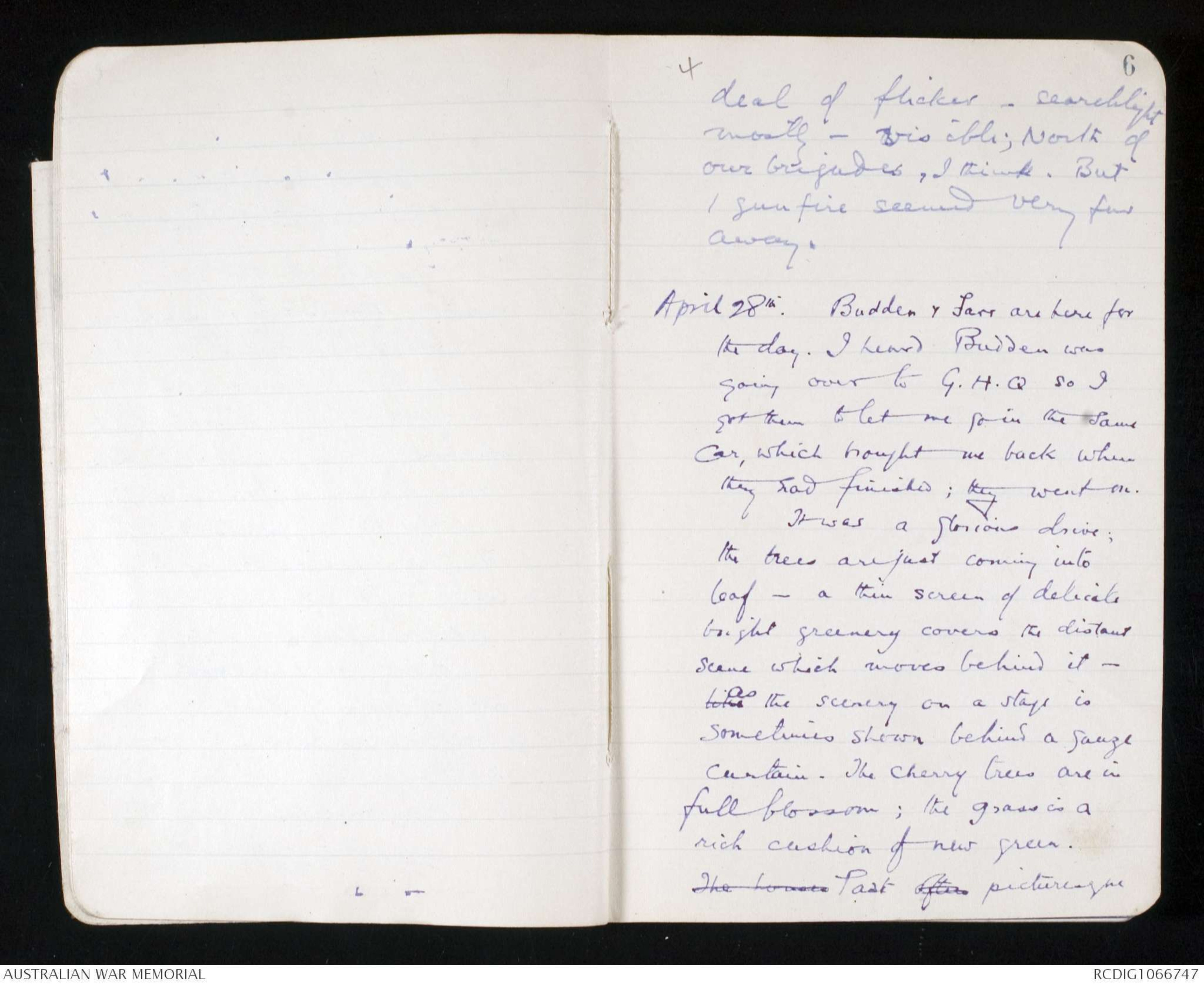
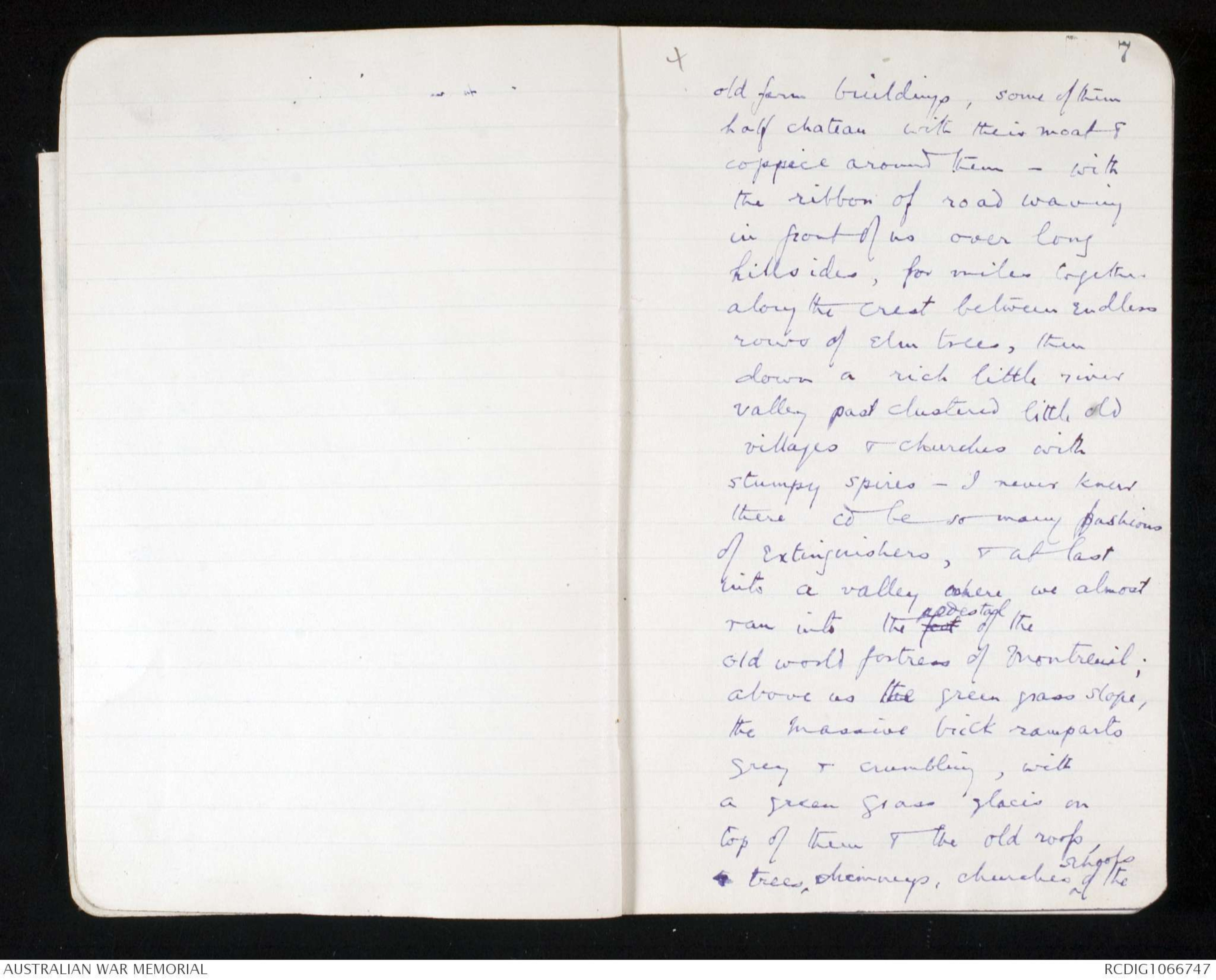
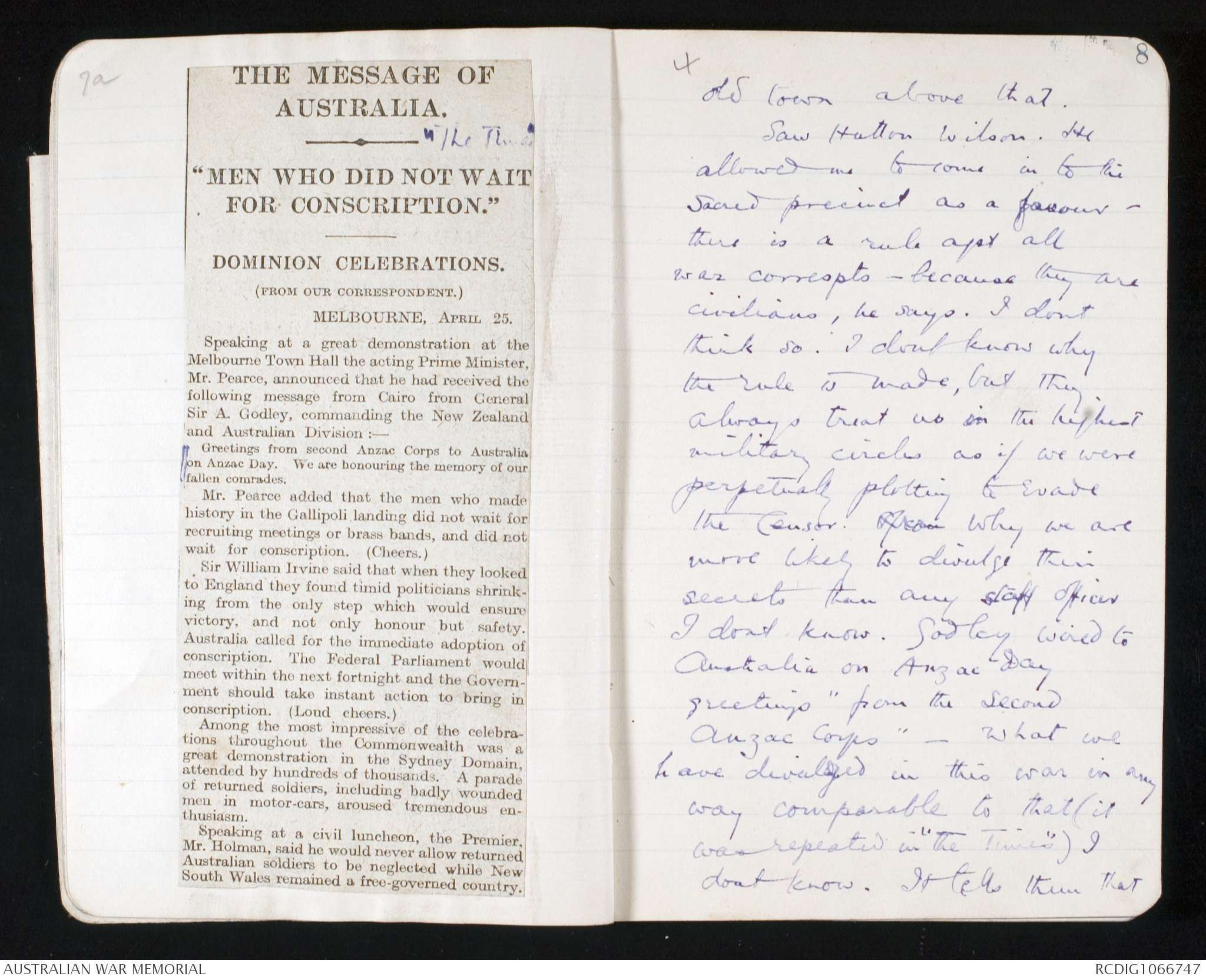
AWM38
Official History,
1914-18 War: Records of C E W Bean,
Official Historian.
Diaries and Notebooks
Item number: 3DRL606/43/1
Title: Diary, April - May 1916
includes references to Gallipoli (Quinn's Post
Sir John Monash etc) and the German attack of
6 May 1916.
1916
Ap 27 to
May 8
Original DIARY NO.43
AWM38 3DRL 606 ITEM 43 [1]
DIARIES AND NOTES OF C. E. W. BEAN
CONCERNING THE WAR OF 1914 - 1918
THE use of these diaries and notes is subject to conditions laid down in the terms
of gift to the Australian War Memorial. But apart from those terms, I wish the
following circumstances and consideration to be brought to the notice of every
reader and writer who may use them.
These writings represent only what at the moment of making them I believed to be
true. The diaries were jotted down almost daily with the object of recording what
was then in the writer's mind. Often he wrote them when very tired and half asleep;
also not infrequently, what he believed to be true was not so - but it does not
follow that he always discovered this, or remembered to correct the mistake when
discovered. Indeed he could not always remember that he had written them.
These records should, therefore, be used with great caution, as relating only what
their author, at the time of writing believed. Further, he cannot, of course, vouch
for the accuracy of statements made to him by others and here recorded. But he
did try to ensure such accuracy by consulting, as far as possible, those who had
seen or otherwise taken part in the events. The constant falsity of second-hand
evidence (on which a large proportion of wat stories are founded) was impressed
upon him by the second or third day of the Gallipoli campaign, notwithstanding that
those who passed on such stories usually themselves believed them to be true. All
second-hand evidence herein should be read with this in mind.
16 Sept., 1946. C. E. W. BEAN
AUSTRALIAN WAR MEMORIAL
ACCESS STATUS
OPEN
5 43
[[?]]mann's "German
for military students"
Pooles 2nd Hand [[?book shop]]
Charring X Road.
4 1
1916
Ap 27 to
May 8
April 27th.
I spent whole day at 1st & 2nd
Divl H.Q. with the Field cashiers
working at the Anzac Book plates
got about 3000 in.
Sir D. Haig was around w
Genl White. He saw 3rd Bde,
& was very pleased w / way
they handled their arms; afterwds
he saw 2nd Bde & was even
more pleased. "You've a fine
division," he sd to Walker.
He spoke to a number of
NCOs & men. White sd they were
excellent. He also saw the 3rd FA.
Bde.
Yesterday night some o /
billets o / 11th Bn found
their eyes running strangely.
They didn't know what it
ws at first until they
realised it must be gas shell
lacrymatory shells somewhere
4 2
in / neighbourhood. This morn
The day before yesty a
farm in wh B. Coy of / 17th
Bn were billeted was suddenly
visited by an 8 in shell.
It crashed in / yard. The
officers (5 were there) hurriedlybut got their men out
under / hedges - some of
them didnt like leaving /
farm - it's only a chance
shot, they said. But a
minute or two later down
came another & they put in
140 altogether. After / first
batch they waited 12 minutes
& then put in a second batch;X then a break for 25 minutes
& then a third batch. Not
a man ws hit except a
sergt who had his leg broken
trying to save some papers; but
390 Anzac Book plates &
4 3
rolls were burnt before they
cd be rescued. "I wish they'd
saved those & left the crime
sheets," said the C.O. He had
not even a tooth brush left.
The This enemy had noticed
movement abt / place,
clearly - Kushe Farm.
This morning near a
field ambulance at the
Erquinghem X roads, where
troops can almost always
be seen, down came abt
20 shrapnel shells. They
killed a woman & three children
& wounded four of our
men. That is / luck of it. The Probably
men who have were moving
there yesty or / day before, &probly ^they brought this shelling
down; & / people who live
there ^today are / ones who suffer.
4 4
You cant blame / Germans, I
suppose - of course you cant.
But / sight of those kiddies & /
woman, suddenly dead, must
be simply maddening.
[*? Div.*] The 50 Reserve Corps is sd to
be opp. our left & the 6 Bavarian
[*? Div.*] Reserve Corps opp. our right.
The enemy gave sent over some
gas at Loos, ^far to / south of
us, yesty & got two lines
of trench but we ^the British retook
them. And / Germans raided to /
North of us but only 3 reached / trench
Just now as I ws sittingin a ringing up G.H.Q for leave
to have a motor car, the
signal man at / exchange sd
"Have you finished, Sir. Priority
message from 2nd Australian
Division is waiting to come
thro'." I finished up at oncespot & Kennedy got / message.
"Gas attack on our right Bde."
4 5
That was all. Presently
in came the normal gas alarm telegram.
I waited to hear the details
when they shd come thro'. But
it turned out tt / Bde on our
left had warned / left Bde
tt a gas attack ws being
made on them. The wind
is in / right quarter & abt / rightAs I came to
strength & / enemy has bn
seen testing / strength of it
opposite our lines. He is
doing a lot of hammering
too, in one place &
putting up some erection
about 2ft above / level
o / parapet.
Also we can notice him
moving into billets - wh
is welcome hearing; & our
artillery has dispersed one
of his working parties.
As I walked home
just now there ws a good
4 6
deal of flicker - searchlight
mostly - visible; North of
our brigades, I think. But
/ gunfire seemed very far
away.
April 28th. Budden & Farr are here for
the day. I heard Budden was
going over to G.H.Q so I
got them to let me go in the same
car, which brought me back when
they had finished; they went on.
It was a glorious drive;
the trees are just coming into
leaf - a thin screen of delicate
bright greenery covers the distant
scene which moves behind it - like as the scenery on a stage is
sometimes shown behind a gauze
curtain. The cherry trees are in
full blossom; the grass is a
rich cushion of new green.The houses Past after picturesque
4 7
old farm buildings, some of them
half chateau with their moat &
coppice around them - with
the ribbon of road waving
in front of us over long
hillsides, for miles together
along the crest between endless
rows of elm trees, then
down a rich little river
valley past clustered little old
villages & churches with
stumpy spires - I never knew
there cd be so many fashions
of extinguishers, & at last
into a valley where we almost
ran into the foot ^pedestal of the
old world fortress of Montreuil;
above us the green grass slope,
the massive brick ramparts
grey & crumbling, with
a green grass glacis on
top of them & the old roofs,& trees, chimneys, churches ^schools of the
7a
THE MESSAGE OF
AUSTRALIA.
[*"The Times"*]
"MEN WHO DID NOT WAIT
FOR CONSCRIPTION."
DOMINION CELEBRATIONS.
(FROM OUR CORRESPONDENT.)
MELBOURNE, APRIL 25.
Speaking at a great demonstration at the
Melbourne Town Hall the acting Prime Minister,
Mr. Pearce, announced that he had received the
following message from Cairo from General
Sir A. Godley, commanding the New Zealand
and Australian Division: -
Greetings from second Anzac Corps to Australia
on Anzac Day. We are honouring the memory of our
fallen comrades.
Mr. Pearce added that the men who made
history in the Gallipoli landing did not wait for
recruiting meetings or brass bands, and did not
wait for conscription. (Cheers.)
Sir William Irvine said that when they looked
to England they found timid politicians shrinking
from the only step which would ensure
victory, and not only honour but safety.
Australia called for the immediate adoption of
conscription. The Federal Parliament would
meet within the next fortnight and the Government
should take instant action to bring in
conscription. (Loud cheers.)
Among the most impressive of the celebrations
throughout the Commonwealth was a
great demonstration in the Sydney Domain,
attended by hundreds of thousands. A parade
of returned soldiers, including badly wounded
men in motor-cars, aroused tremendous enthusiasm.
Speaking at a civil luncheon, the Premier,
Mr. Holman, said he would never allow returned
Australian soldiers to be neglected while New
South Wales remained a free-governed country.
4 8
old town above that.
Saw Hutton Wilson. He
allowed me to come in to the
sacred precinct as a favour -
there is a rule agst all
war correspts - because they are
civilians, he says. I dont
think so. I dont know why
the rule is made, but they
always treat us in the highest
military circles as if we were
perpetually plotting to evade
the Censor. Of cou Why we are
move likely to divulge their
secrets than any staff officer
I dont know. Godley wired to
Australia on Anzac Day
greetings "from the second
Anzac Corps" - what we
have divulged in this war in any
way comparable to that (it
was repeated in "The Times") I
dont know. It tells them that
 Deb Parkinson
Deb ParkinsonThis transcription item is now locked to you for editing. To release the lock either Save your changes or Cancel.
This lock will be automatically released after 60 minutes of inactivity.